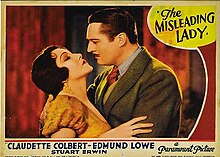Plot
Helen Steele (Claudette Colbert) is bored to death of her empty lifestyle as a socialite. She decides to become an actress, but cannot get to see producer Sydney Parker (Robert Strange). She learns that Parker will be at a party at the home of her friend Alice Connell. She wants the lead in Parker's play The Siren. He feels that she is too nice a girl to convincingly play the part, so she bets him that, in exchange for an audition, she will be able to make Parker's friend, mining engineer Jack Craigen (Edmund Lowe), fall in love with her within three days.
She records Jack's proposal of marriage on a phonograph record to provide proof, but then has second thoughts about what she has done. Before she can explain the situation to Jack, he is publicly humiliated when he and all of the other guests inadvertently hear the recording. As Jack storms out, he is introduced to Tracy, Helen's fiancé. Helen breaks off her engagement and rushes to Jack's room to try to explain. Jack kidnaps her and steals another guest's autogyro to take to his home.
When she tries to escape, he chains her up. While he is out getting some water to make coffee, she spots another man. He sneaks in, but then reveals that he is an escapee from a nearby mental asylum and thinks he is "Boney". She screams for help when he grabs a sword. Jack plays along and manages to trick the lunatic into entering a room, which Jack then locks. After Jack receives a call informing him that Tracy is on his way there, armed with a gun, he decides to let Helen go, but then they argue. During the ensuing struggle, she hits him on the head with a hammer, knocking him out, and runs away into the snow-filled woods. She manages to reach a forest ranger. Meanwhile, Boney gets out and locks Jack up.
Reporter Fitzpatrick shows up, and mistaking the madman for Jack, warns him that Tracy is coming. Then two asylum guards show up to collect Boney, but he manages to get away. Eventually, everything gets straightened out, and the couple reconcile.
This page is based on this
Wikipedia article Text is available under the
CC BY-SA 4.0 license; additional terms may apply.
Images, videos and audio are available under their respective licenses.
